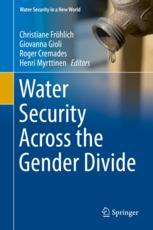

Most ebook files are in PDF format, so you can easily read them using various software such as Foxit Reader or directly on the Google Chrome browser.
Some ebook files are released by publishers in other formats such as .awz, .mobi, .epub, .fb2, etc. You may need to install specific software to read these formats on mobile/PC, such as Calibre.
Please read the tutorial at this link: https://ebookbell.com/faq
We offer FREE conversion to the popular formats you request; however, this may take some time. Therefore, right after payment, please email us, and we will try to provide the service as quickly as possible.
For some exceptional file formats or broken links (if any), please refrain from opening any disputes. Instead, email us first, and we will try to assist within a maximum of 6 hours.
EbookBell Team

4.0
6 reviewsThis book examines water security as a prime example of how the economic, socio-cultural and political-normative systems that regulate access to water reflect the evolving and gendered power relations between different societal groups. Access to water is characterized by inequalities: it depends not only on natural water availability, but also on the respective socio-political context. It is regulated by gender-differentiated roles and responsibilities towards the resource, which are strongly influenced by, among others, tradition, religion, customary law, geographical availability, as well as the historical and socio-political context.
While gender has been recognized as a key intervening variable in achieving equitable water access, most studies fail to acknowledge the deep interrelations between social structures and patterns of water use. Proof of these shortcomings is the enduring lack of data on water accessibility, availability and utilization that sufficiently acknowledges the relational nature of gender and other categories of power and difference, like class and socioeconomic status, as well as their comprehensive analysis. This book addresses this major research gap.